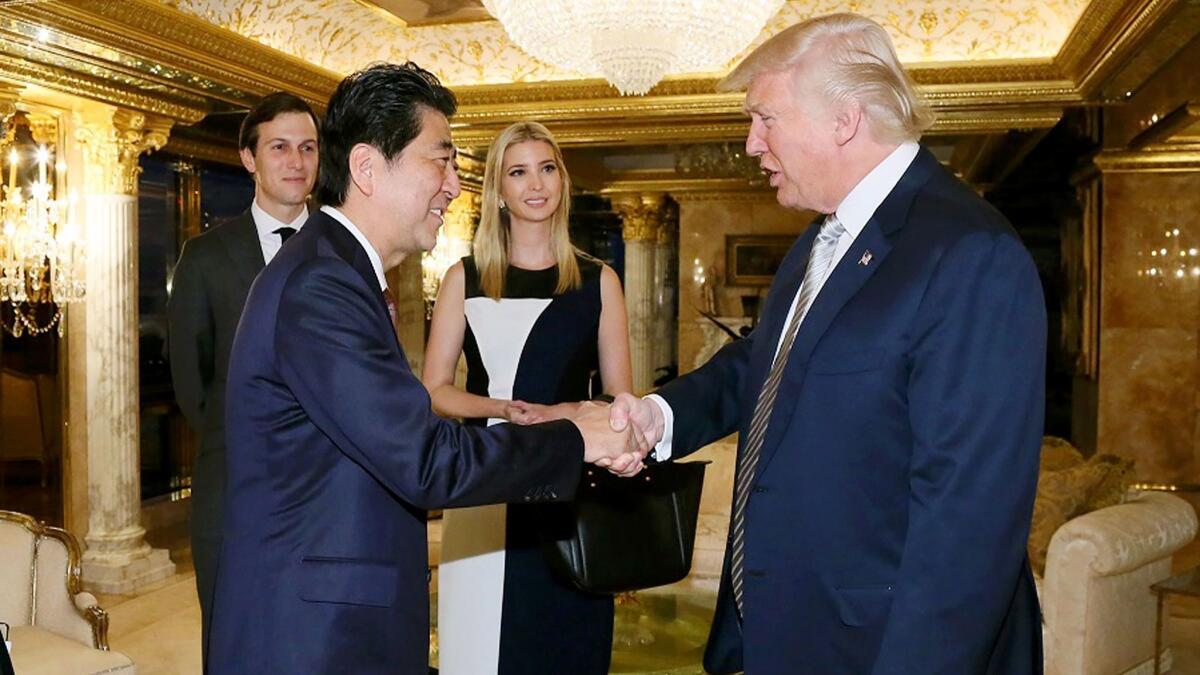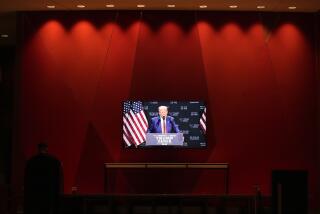Op-Ed: Trump admits he has a kleptocracy problem, but so far, he hasn’t got a solution

Let us now praise Donald Trump — on one count, anyway: He realizes he faces an ethics problem. Last week, when the president-elect talked to the New York Times, he was widely quoted as saying that conflict of interest laws don’t apply to the president. “The law is totally on my side,” he said. “The president can’t have a conflict of interest.”
But some of the news accounts left out what Trump said next: He acknowledged that the law is peculiar, and that it would look bad if he were to negotiate deals for golf courses or hotels from the Oval Office.
“The president of the United States is allowed to have whatever conflicts he or she wants — but I don’t want to go by that,” he said.
As a technical, legal issue, Trump is right: Congress has exempted the president and vice president from conflict of interest laws. But that doesn’t mean a president can’t have an actual conflict of interest — especially if his family business engages in real estate deals with foreign governments. And Trump acknowledged that.
If Trump were forced to sell the business now, he might be forced to accept fire sale prices — and could even get stuck with a huge tax bill.
“In theory, I don’t have to do anything, but I would like to do something — I would like to try and formalize something,” he added. “I don’t care about my business…. I don’t want to have people saying ‘conflict.’ ”
So far, so good. The first step toward solving a problem is recognizing that you have one. But here’s the catch: Trump isn’t willing to do what most other recent presidents have done, which is to sell his assets and put the proceeds into a blind trust.
As a human matter, that’s understandable. He’s spent his life building the Trump Organization around his real estate holdings and his brand. Eventually, he planned to pass the business on to his children; selling it off would be a bitter pill.
If Trump were forced to sell the business now, he might be forced to accept fire sale prices — and could even get stuck with a huge tax bill. (Officials who are covered by the conflict of interest law are exempt from the tax hit, but, remember, Trump isn’t covered.)
Besides, a sale could also reveal that Trump’s fortune is far smaller than he has claimed. No wonder he’s resisting.
Trump’s original solution was to hand the business to his children while he’s in the White House, but he’d still be the principal owner. He could sell his holdings to the kids, but that wouldn’t resolve every issue either, because any government decision that touched the company would still affect his family’s wealth.
One option, ethics lawyers say, is for Trump to set up a formal “firewall” between himself and the business. He couldn’t discuss the business with his children or anyone else, and he would have to recuse himself from policy questions that specifically affect the business; his children would have to get government approval for foreign business deals. All of this would need to be in writing, with a White House lawyer empowered to enforce it.
That might be workable — but only if Trump means what he says about avoiding the appearance of conflicts. He hasn’t measured up to that standard so far.
In the past two weeks, he urged British politicians to lobby against offshore wind farms that could be visible from Trump golf courses in Scotland; boosted his business partner in Turkey in a phone call with the Turkish president; and brought his daughter Ivanka, who handles Trump business in Asia, into a meeting with Japan’s prime minister.
And when all that was inevitably reported, Trump erupted on Twitter. “Prior to the election it was well known that I have interests in properties all over the world,” he wrote. “Only the crooked media makes this a big deal!”
But it wasn’t only the media. Rep. Justin Amash, a tea party Republican from Michigan, responded with another tweet: “You rightly criticized Hillary for Clinton Foundation. If you have contracts with foreign [governments], it’s certainly a big deal, too. #DrainTheSwamp.”
The truth is, opportunities for conflicts of interest will arise whether Trump seeks them out or not. Entrepreneurs will try their luck. Foreign governments will seek to gain favor with the White House by cutting deals with the president’s children, just as they can in a third world kleptocracy. What have they got to lose?
“It’s inevitable,” warned Richard Painter, chief ethics officer in the George W. Bush White House. “At some point, someone working for him is going to mix private and public interests, whether in the White House or the Trump Organization. Even if the president-elect has the best of intentions, he’s not going to escape that kind of allegation. It’s going to be a headache for him every other day.”
Unless Trump sets tough, clear rules and a formalizes a way to enforce them, the result is predictable: opportunities for investigative journalists, openings for Democrats to paint the president as a profiteer and recurring bouts of discomfort for Republicans.
One more prediction: President Trump will rage against his critics, but he’ll have only himself to blame.
Twitter: @DoyleMcManus
Follow the Opinion section on Twitter @latimesopinion and Facebook
MORE FROM OPINION
Stop Proposition 8, and marriage inequality in California, from making a comeback
Humans may dream of traveling to Mars, but our bodies aren’t built for it
How to make riders feel safer on L.A.’s public transit system
More to Read
A cure for the common opinion
Get thought-provoking perspectives with our weekly newsletter.
You may occasionally receive promotional content from the Los Angeles Times.











